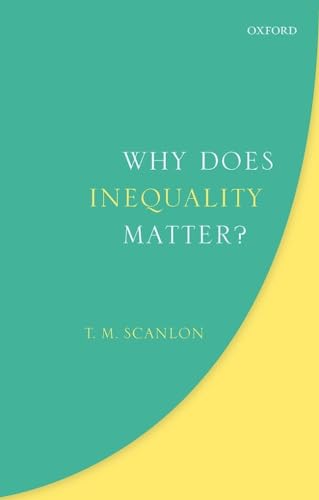Verwandte Artikel zu Why Does Inequality Matter? (Uehiro Series in Practical...

Inhaltsangabe
Inequality is widely regarded as morally objectionable: T. M. Scanlon investigates why it matters to us. Demands for greater equality can seem puzzling, because it can be unclear what reason people have for objecting to the difference between what they have and what others have, as opposed simply to wanting to be better off. This book examines six such reasons. Inequality can be objectionable because it arises from a failure of some agent to give equal concern to the interests of different parties to whom it is obligated to provide some good. It can be objectionable because it involves or gives rise to objectionable inequalities in status. It can be objectionable because it gives the rich unacceptable forms of control over the lives of those who have less. It can be objectionable because it interferes with the procedural fairness of economic institutions, or because it deprives some people of substantive opportunity to take part in those institutions. Inequality can be objectionable because it interferes with the fairness of political institutions. Finally, inequality in wealth and income can be objectionable because it is unfair: the institutional mechanisms that produce it cannot be justified in the relevant way. Scanlon's aims is to provide a moral anatomy of these six reasons, and the ideas of equality that they involve. He also examines objections to the pursuit of equality on the ground that it involves objectionable interference with individual liberty, and argues that ideas of desert do not provide a basis either for justifying significant economic inequality or for objecting to it.
Die Inhaltsangabe kann sich auf eine andere Ausgabe dieses Titels beziehen.
Über die Autorin bzw. den Autor
T. M. Scanlon attended Princeton University (BA in Philosophy, 1962), studied at Oxford, Brasenose College, 1962-63, and then at Harvard University (PhD in Philosophy, 1968). Scanlon taught philosophy at Princeton 1966-1984, then at Harvard from 1984 until his retirement in 2016. He was one of the founding editors of Philosophy & Public Affairs and has published mainly in moral and political philosophy.
„Über diesen Titel“ kann sich auf eine andere Ausgabe dieses Titels beziehen.
- VerlagOUP Oxford
- Erscheinungsdatum2018
- ISBN 10 0198812698
- ISBN 13 9780198812692
- EinbandTapa dura
- SpracheEnglisch
- Anzahl der Seiten192
- Kontakt zum HerstellerNicht verfügbar
EUR 4,00 für den Versand von Frankreich nach Deutschland
Versandziele, Kosten & DauerNeu kaufen
Diesen Artikel anzeigenEUR 4,56 für den Versand von Vereinigtes Königreich nach Deutschland
Versandziele, Kosten & DauerSuchergebnisse für Why Does Inequality Matter? (Uehiro Series in Practical...
Why Does Inequality Matter
Anbieter: San Francisco Book Company, Paris, Frankreich
Hardcover. Zustand: Very good. Zustand des Schutzumschlags: very good. Cloth/dust jacket Octavo. blue cloth, gilt lettering, dust jacket, 170 pp Standard shipping (no tracking or insurance) / Priority (with tracking) / Custom quote for large or heavy orders. Artikel-Nr. 102173
Anzahl: 1 verfügbar
Why Does Inequality Matter? (Uehiro Series in Practical Ethics)
Anbieter: PBShop.store UK, Fairford, GLOS, Vereinigtes Königreich
HRD. Zustand: New. New Book. Shipped from UK. Established seller since 2000. Artikel-Nr. FU-9780198812692
Anzahl: 15 verfügbar
Why Does Inequality Matter?
Anbieter: AHA-BUCH GmbH, Einbeck, Deutschland
Buch. Zustand: Neu. Neuware - Inequality is widely regarded as morally objectionable: T. M. Scanlon investigates why it matters to us. Demands for greater equality can seem puzzling, because it can be unclear what reason people have for objecting to the difference between what they have and what others have, as opposed simply to wanting to be better off. This book examines six such reasons. Inequality can be objectionable because it arises from a failure of some agent to give equal concern to the interests of different parties to whom it is obligated to provide some good. It can be objectionable because it involves or gives rise to objectionable inequalities in status. It can be objectionable because it gives the rich unacceptable forms of control over the lives of those who have less. It can be objectionable because it interferes with the procedural fairness of economic institutions, or because it deprives some people of substantive opportunity to take part in those institutions. Inequality can be objectionable because it interferes with the fairness of political institutions. Finally, inequality in wealth and income can be objectionable because it is unfair: the institutional mechanisms that produce it cannot be justified in the relevant way. Scanlon's aims is to provide a moral anatomy of these six reasons, and the ideas of equality that they involve. He also examines objections to the pursuit of equality on the ground that it involves objectionable interference with individual liberty, and argues that ideas of desert do not provide a basis either for justifying significant economic inequality or for objecting to it. Artikel-Nr. 9780198812692
Anzahl: 3 verfügbar
Why Does Inequality Matter?
Anbieter: moluna, Greven, Deutschland
Zustand: New. Inequality is widely regarded as morally objectionable: T. M. Scanlon investigates why it matters to us. He considers the nature and importance of equality of opportunity, whether the pursuit of greater equality involves objectionable interference with ind. Artikel-Nr. 180334815
Anzahl: 2 verfügbar
Why Does Inequality Matter? (Uehiro Series in Practical Ethics)
Anbieter: Ria Christie Collections, Uxbridge, Vereinigtes Königreich
Zustand: New. In. Artikel-Nr. ria9780198812692_new
Anzahl: 2 verfügbar
Why Does Inequality Matter?
Anbieter: Revaluation Books, Exeter, Vereinigtes Königreich
Hardcover. Zustand: Brand New. 170 pages. 8.75x5.75x0.75 inches. In Stock. Artikel-Nr. __0198812698
Anzahl: 1 verfügbar
Why Does Inequality Matter?
Anbieter: Revaluation Books, Exeter, Vereinigtes Königreich
Hardcover. Zustand: Brand New. 170 pages. 8.75x5.75x0.75 inches. In Stock. Artikel-Nr. x-0198812698
Anzahl: 2 verfügbar

